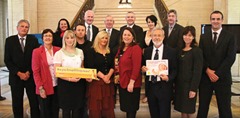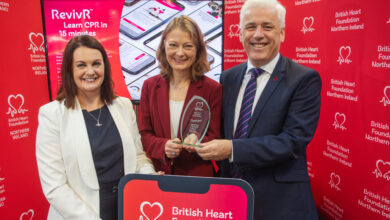Health Committee progress report
Michael McKernan reviews the Health Committee’s work in the current Assembly term. A more workmanlike attitude between the Minister and members has resulted in better scrutiny of this vital policy area.
Although health is invariably high profile, and the health department commands resources which account for almost half of Northern Ireland’s total budget, the ministry was almost last pick when the parties in the Executive sat down to allocate departments in May 2011.
The reason for its relative unpopularity is of course fairly obvious. Most of the ‘high profile’ is negative. Ministers and senior healthcare managers get little public acknowledgement for the many thousands of things that go well every day but are sharply criticised, in some cases hounded, when things go wrong. Also, despite the massive budget allocation, there are financial pressures everywhere due to the ever expanding costs arising from new drugs, treatments and equipment and an ageing population with higher healthcare demands and expectations.
So for any Minister of any party, the health portfolio is always going to be challenging and his or her performance closely scrutinised.
Apart from the media, the principal scrutineer is the Assembly’s Health, Social Services and Public Safety Committee. The 11-member committee has extensive powers to support and advise and hold the Minister to account, and specifically powers to:
• consider and advise on budgets, financial plans and proposals;
• consider all relevant secondary legislation and conduct the committee stage of primary legislation;
• call for any papers it wishes to examine and persons it wishes to seek evidence from;
• initiate inquiries and produce reports; and
• consider and advise on any matters brought to it by the Minister.
The committee is chaired by Sinn Féin’s Maeve McLaughlin and there are nine other members at present: Jim Wells, Gordon Dunne, David McIlveen and Pam Brown (DUP); Roy Beggs and Sam Gardiner (UUP); Mickey Brady (Sinn Féin); Fearghal McKinney (SDLP); and Kieran McCarthy (Alliance). Another vacancy is not yet filled following the departure from the Assembly of SDLP MLA Conall McDevitt.
Although the present Health Minister Edwin Poots has had his moments with the committee, particularly in relation to his outspoken views on abortion, gay blood donors and gay adoptions, relations between the Minister and the committee in the current mandate are much more workmanlike than they have been in the past.
Previously, there had been frequent heated exchanges between the then UUP Minister Michael McGimpsey and Chair Iris Robinson, supported by her DUP colleagues. Now things are less fractious. This may be because the Minister is DUP and has four colleagues on the committee, including his anticipated successor Jim Wells in the role of Vice-Chair, or it may be that the institutional arrangements have bedded down and there is general acceptance that running health is not particularly easy for anyone.
In any event, members’ attendance at the committee has been very solid overall at just short of 90 per cent out of almost 80 meetings in the current mandate.
The committee has also kept itself fairly busy, producing reports into the review of inequalities in health (January 2013) and Tobacco Retailers Bill (October 2013) and as well as two legislative consent motions, one on the Protection of Freedoms Bill (June 2011) which provides for measures to enhance the protection of children and vulnerable adults from abuse and the other on the Care Bill (June 2013) aimed at making it easier for people to obtain a social care package closer to their families.
The Tobacco Retailers Bill is at the line-by-line scrutiny stage although the committee is very much in favour of the overall thrust of the Bill, which is to make it more difficult for younger people to obtain cigarettes and to introduce tougher sanctions for retailers who sell to under 18s.
The committee has no formal inquiries under way at present but has stated its intention to carry out a series of inquiries into some of the 10 themes contained in Transforming Your Care – the major reform package currently under way. The committee has declared that it will be monitoring the implementation of TYC very closely.
It can be expected that there will be a particular focus on the controversial issue of how elderly occupants of care homes are treated as the department moves to close down old run-down facilities and replace them with much more modern and fit-for-purpose accommodation.
As well as producing reports and initiating inquiries, the committee has published a number of research papers around health issues. Two of these relate to evidence gathered in the committee’s consideration of evidence around the Tobacco Licensing Bill and the review of health inequalities report.
The other research papers relate to the question of cancelled outpatient appointments and health service general performance in relation to waiting lists and waiting times. Research has also been published in relation to consultant-led appointments and those outpatient appointments that have been cancelled by hospitals.
On two cross-cutting issues, the Health, Social Services and Public Safety Committee sat in joint session with other committees. These were with the Agriculture and Rural Development Committee on food health and contaminated meat issues and with the Justice Committee on issues around addressing the exploitation of children in the care system.
Reducing inequalities
The committee produced a substantial report on its review of health inequalities and with it a series of recommendations. The intention was that the committee’s conclusions and recommendations could feed into the department’s overall 10-year public health framework.
The principal recommendations of the final report were as follows:
• health should be better integrated into overall regional strategy for Northern Ireland and into various strategies of other departments;
• a government ‘department of children and young people’ should be established;
• enhanced legislative and resource provision to support parenting and breast-feeding as important early interventions;
• greater collaboration, use of community assets and upskilling across all agencies involved in healthcare; and
• a target of increasing spending on ‘prevention’ in public health to 6 per cent of the total health budget.
The committee took evidence from a number of expert witnesses and the Chair and Vice-Chair travelled to Cuba to bring back lessons from a country regarded as having a very successful approach to public health.
The best contact for reaching the committee is via the clerk, Kathryn Aiken, using the following contact details: Room 414, Parliament Buildings, Ballymiscaw, Stormont, Belfast BT4 3XX. Tel: 028 9052 1841 E: committee.hssps@niassembly.gov.uk






